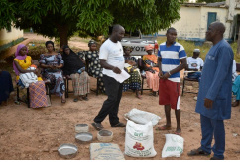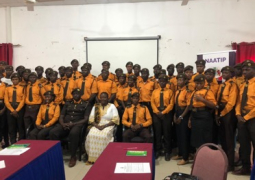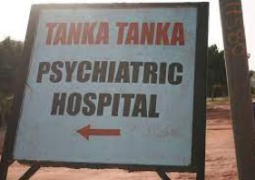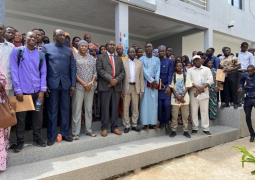
The training, divided into three groups -five days for each - seeks to enhance the capacity of small ruminant farmers on small ruminant production, productivity as well as reproductive management.
The training, also focused on small ruminant disease identification and prevention, breeding and reproductive health management, small ruminant commercial farming, feed and nutrition, and pasture development and management.
The capacity building forum was in line with Small Ruminant Production Enhancement Project’s overall objective which is to contribute to the improvement of livelihood of rural farmers and peri-urban communities in The Gambia by strengthening the productivity and resilience of pastoral systems and stimulating business entrepreneurship in the livestock sector through the enhancement of small ruminant production.
DLS is the implementing partner of the Small Ruminant Production Enhancement Project (SRPEP)
Nerry Corr, Small Ruminant Value Chain Specialist at Small Ruminant Production Enhancement Project (SRPEP), declared the project would benefit the entire Gambia.
The project, he added, will significantly enhance livestock production by controlling major small ruminant diseases, digging of 20 boreholes for needy communities, construction of livestock markets and slaughter slabs, develop pasture farms as well as serve as a window of micro-finance.
He thanked the Government of The Gambia for sponsoring the project.
“The Gambians spend a lot of money in buying small ruminants from neighbouring countries but if there are enough small ruminants in the country with enough feed, would ensure we are vaccinated to stay healthy then buying small ruminant outside the country will be a thing of the past.
Dr. Abdou Ceesay, Director General for the Department of Livestock Services thanked participants for their commitment to the development of the livestock sector of the country.
He pointed out that the livestock sector contributes greatly to the socio-economy of the national GDP of the country.
However, despite the immense contribution, the sector continues to face a lot of challenges which include among others the high disease rate among livestock, inadequate capacity among stakeholders within the livestock sector.
He noted that as a result, Government is working to address some of the challenges.
“One of the things hampering small ruminant production in the country is the lack of capacity both at institutional and small ruminant farmers levels,” he stated, saying they believe participants have gathered enough knowledge that would help them in the improvement of small ruminant production and productivity improvement in the country.
He highlighted Government’s commitment to continue to support livestock producers and initiatives in the country.
Kebba Darboe, deputy governor for Lower River Region urged participants to use the knowledge gained to contribute to the improvement of the livelihood of rural farmers by strengthening the production and productivity of small ruminant in the country.
According to him, Government attaches great importance to small ruminant production.
Alh. Sorry Dem, a participant urged his fellow participants to utilise the knowledge gained for the benefit of the country. He thanked the small ruminant project for their assistance and knowledge impacted to them.




